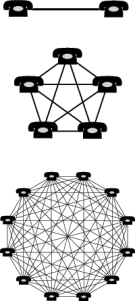 The newly enabled ability to publish to Twitter from Facebook Pages has led Nic Brisbourne of DFJ Esprit to think this may lead to an erosion of value in the owner of the social graph. He goes on to pose the question whether eyeballs are actually more important than the ownership of the social graph.
The newly enabled ability to publish to Twitter from Facebook Pages has led Nic Brisbourne of DFJ Esprit to think this may lead to an erosion of value in the owner of the social graph. He goes on to pose the question whether eyeballs are actually more important than the ownership of the social graph.
My thinking on the issue is differs from Nic's.
Social media relies on the network effect. Over the past 15 years of the internet, we have learned that the network effect (and metcalfe's thinking) thrives in open environments. To revisit, one only has to remember AOL. Therefore, in the race to claim ownership of the social graph, the walls would always have to be temporary – one competitive barrier as the players tried toreach critical mass. The more open direction Facebook has been taking lately is a critical strategic one. It's also the only one available if it will survive, and perhaps eventually win at creating the identity layer of the internet – the social graph.
Openness will ensure the sustainability of Facebook's (or Twitters's) social graph, as it continues to enhance the value its users derive from the investment they make in maintainging their connections on Facebook. It would be the erosion of that value, not the fact that other platforms can benefit from those users' previous efforts (establishing their connections) to provide higher utility to those users, that would threaten the value of Facebook's social graph.
Nic goes on to remark:
The upshot of all this that value doesn’t accrue to the ‘owner’ of the
social graph every time it is used and hence the value of these sites
is less about the number of registered members and more about the
amount of time people spend on them creating and consuming content.Facebook’s acquisition of Friendfeed makes sense in this light, as does the recent rush of investor interest in companies like Tweetdeck.
The game doesn’t stop here though – to generate real value you need to make your app/site sticky and find a way to monetise. ILike and Slide’s falls from grace have shown us that.
Measuring the real value of the social graph in terms of the stickiness of a media property or its monetisation ability is limiting. I think that we are not close to understanding the commercial value that could be extracted once the identity layer of the internet is established.
For me, the one area that seems to look more and more critical in the emergence of the social graph is in whose hands it ultimately ends up. If Facebook wins, and it remains a private (or publicly-traded) commercial entity, the profit maximization motive (especially the short-term profit focus prevalent in public equity markets) may ultimately limit the value it stands to deliver. Imagine how incredibly limited the Internet would end up if the global system of interconnected networks it resides on belonged to the telecommunicatiosn companies (sort of like the way mobile networks have evolved).
I don't really know if the thinking within Facebook is along these lines. So far, by resisting desperate monetization attempts or early acquisiton offers, they hint that it may be.
social graph’in kimde kalacağı ve bundan nasıl faydalanabileceğimiz önemli gerçekten. o graph i nasıl kullanabileceğimiz, o graph üzerinden recommendationlar verme arayışlarımız devam ediyor ama facebook pek güven veren bir yapı değil
LikeLike
@deniz, why do you think that Facebook doesn’t seem trustworthy?
LikeLike
Thanks for the link. You make a good point that the identity layer will be very important, and also that it would be better if it wasn’t controlled by a single company. I see that as a little different to the social graph though.
LikeLike